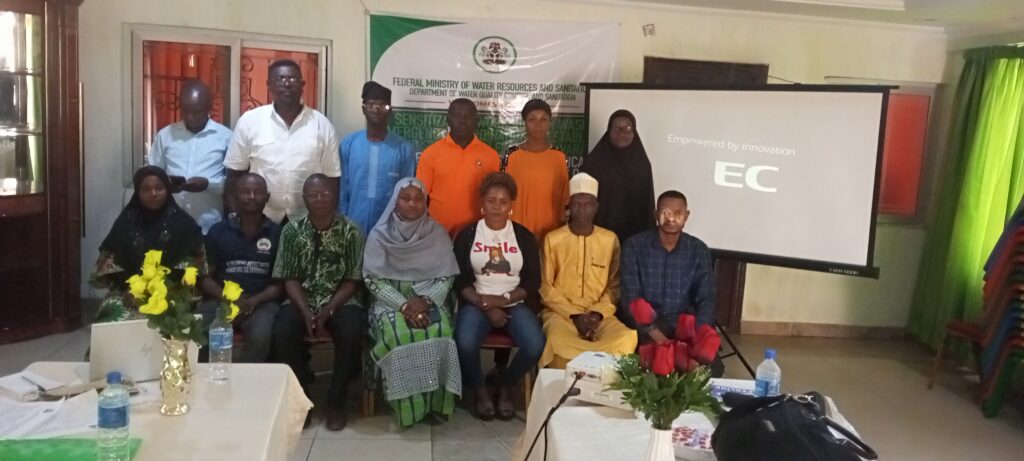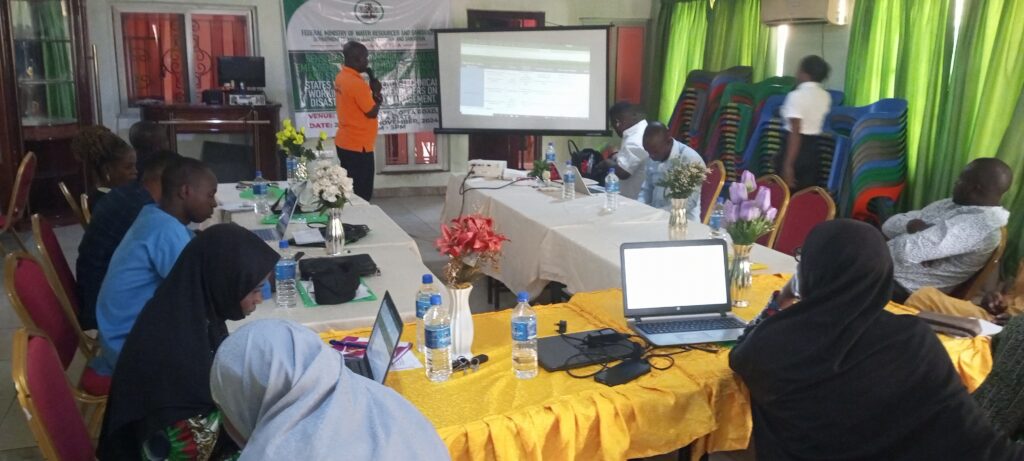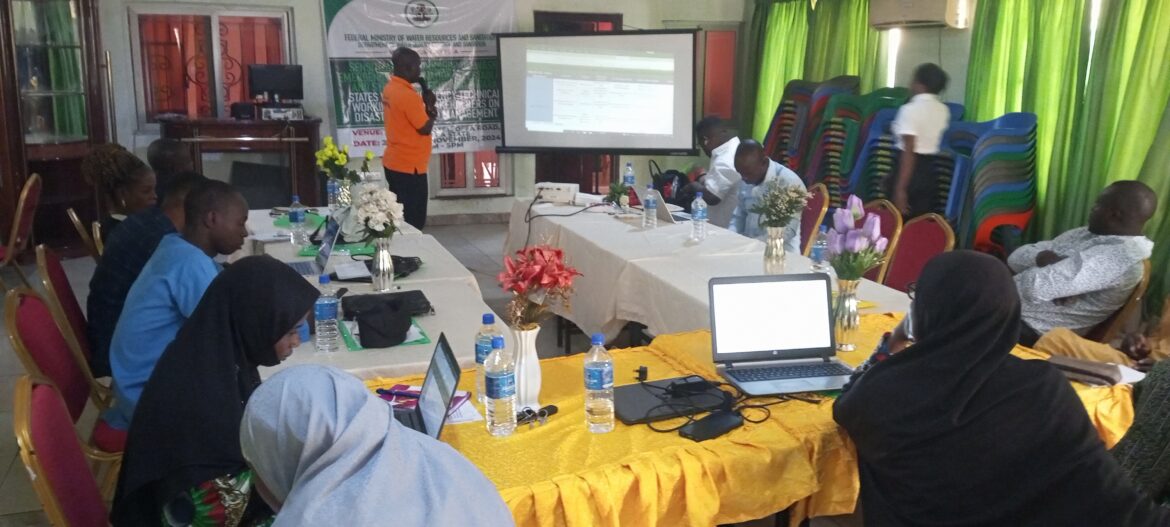By Adeleke Gbenga
It was not an alarm, neither was it an emergency hoax to cause panic or fear. But the message was inbuilt with tone of a need for urgency, rapid response and quick action. The message did not outrightly mention it, it inadvertently however hinted something about response capacities of the two states, Kwara and Ekiti States.
But for Obofin Charles, the lanky brawny ebony skin staff of the Department of Water Quality and Contrast, Federal Ministry of Water Resource and Sanitation, Abuja, who was in Kwara State with his colleagues from the Federal Capital Territory for facilitation of a two-day sensitization workshop, the message was necessary. The Kwara/Ekiti’s response capacities to WASH emergencies appeared to still leave much to be desired.
Just a month to the end of 2024 and with a few steps away to 2025 during which the new year’s first few months might herald a new season of rainfalls, the WASH Emergency Technical Working Group of Kwara and Ekiti, if they were active at all deserved a peer review. And that was what Obofin Charles and Bamidele Segun of the Department of Water Quality and Contrast, Federal Ministry of Water Resource and Sanitation from Abuja did at a sensitization workshop held at Tranquil Hotel along Offa Road Ilorin Kwara State from 26th to 29th of November, 2024.
For Obofin Charles however, with his bravura show of his technical skills on engineering of water productions, sanitation and hygiene, nobody in the audience was left in doubt that these areas were his turf. He proved with meticulousness, his knowledge with which he buffeted the audience.bHe displayed in his presentations, supported with his abstract data and technical details on response capacity he had reviewed and done elsewhere.

What a smart and ambitious young Government bureaucrat he proved to be. The young man from Edo State, with his loud deep and overwhelming voice, and his icy glare of a movie spy simply paddled his canoe with cool and calmness in the confusing stormy and rough waters of his technical data and abstract details, befuddling his listeners.
For him the sensitization workshop on WASH Emergency Coordination which appears to be a flagship of the UNICEF and Federal Ministry of Water Resource and Sanitation in their bulwark against cholera outbreak was nothing but a compelling step in the right direction.
It reminded Kwara and Ekiti to necessarily put their houses in order on WASH Emergency Coordination against cholera outbreak in 2025.
For the Federal Ministry of Water Resource and Sanitation and its supporter, UNICEF, prevention was better than cure in the fight against cholera outbreak. What with experiences of the past that revealed that cholera outbreak is a recurring decimal in Nigeria.
For the 36 States of the Federation, in view of their past records of response capacities to cholera outbreaks, problem of open defecation still yet to be overcome, lack of access to safe and clean drinking water still yet to be tackled, lack of proper waste management and poor sanitation still yet to be solved, the 36 States were said to deserve nothing less than the peer review to evaluate their state of preparedness. Majority of these States’ WASH and Emergency Technical Working Groups were said to have gone comatose due to lack of funding.
Obofin Charles confided this in The Herald on Sunday in an exclusive interview during which he reiterated that Nigeria for now could not eradicate cholera outbreak but might succeed in suppressing it and curtailing its spread. He said most Government officials were fond of promising plans to eliminate cholera in Nigeria, reiterated however that this was impossible for now due to the aforementioned problems of open defecation, lack of access to safe drinking water, poor sanitation and waste management disposal among other challenges still yet to be solved.
Now that the 2025 was being ushered in, with raining season some few months away, the workshop compellingly could not have come at a better time as far as the young Federal Government bureaucrat from Edo State was concerned.
The capacity building again became necessary not only to establish the WASH and Emergency Technical Working Group on disaster management, especially on cholera epidemic but to strengthen the Technical Working Group, he stressed further.
Obofin Charles however speculatedly wondered aloud about number of States, whose WASH Emergency Technical Working Groups were presently active. He tasked and asked himself. However, for Kwara and Ekiti chosen for the workshop, this became a necessary question to ponder.
For example, late 2021, there was a cholera outbreak in Kwara State, claiming at least 40 lives within five days of its outbreak. Another 22 lives were critically ill at hospitals in Moro Local Government Area of Kwara State during the outbreak. Seven pupils of primary and post primary schools were victims. All schools were closed at the period. During this 2001 cholera outbreak, Bode-Saadu, the district headquarters of Moro Local Government Area was said to be the worst hit with 124 reported cases. Other towns badly hit were Jebba, Warafa, Eleja-Sulu, Ile-Pupa, Ekejo, Lasaki and Ejidongari.
Again in 2001, another cholera outbreak struck in Ilorin, the State Capital with Adabata and Okelele reportedly said to be the worst hit. In June 2017, another cholera pandemic was reported in Kwara in 5 Local Government Areas of the State. They included Asa Local Government with 18 cases, Ilorin East Local Government with 450 cases, Ilorin South Local Government with 215 cases, Ilorin West Local Government with 780 cases and Moro Local Government with 50 cases.
It is common in the State Capital to see residents hurriedly dumping their wastes in drainages during heavy rainfalls. Sewages were often seen flowing out of broken channels in densely populated areas of the State Capital. Large number of residences and other buildings in the metropolis are still without toilet facilities, leaving the households with no other option than open defecation.
This is not peculiar to Kwara State, Obofin Charles hit the nail on the head. However for the General Manager of RUWASSA, Mr Olorunfemi Oladipo, the sensitization workshop was a welcome development. He was delighted to welcome delegates from Ekiti State to Kwara even as warmly received staffs of Federal Ministry of Water Resource and Sanitation from Abuja.
He said ”we gathered here today to address a critical aspect of disaster management, ensuring access to safe drinking water, access to sanitation and hygiene(WASH)during emergencies such as cholera and other disease outbreaks. The importance of WASH in preventing the spread of diseases and protecting human dignity can not be overemphasized”
The workshop according to him was a crucial step to strengthen the capacity of the stakeholders in WASH Emergency Coordination sector to respond effectively to WASH emergencies. Mr. Olorunfemi Oladipo reiterated the objectives of the workshop which included, an establishment of a strong WASH Emergency Working Group in Kwara and Ekiti States.
Others were strengthening the capacity of WASH Emergency Working Groups in the two States, to enable them respond to WASH Emergencies. It also included, efforts to strengthen the coordination and collaboration among members of WASH Emergency Working Groups.
The General Manager of RUWASSA, Olorunfemi Oladipo visibly expressed his gratitude to Ministry of Water Resource and Sanitation and other supporters like UNICEF for their commitment to the initiative. He stressed that their presence in Kwara State for the workshop was compelling as it demonstrated their dedication to improve WASH emergency response in Kwara and Ekiti States. He urged the participants to actively engage in the brainstorming that ensued during the workshop. Then, he charged thus,
”let us work together to strengthen our response capacity to WASH emergencies and improve the lives of our people in our two States” The workshop was multi-sectoral in nature, involving participants according to Obofin Charles from various Ministries, Departments and Agencies in the two States. They were drawn from RUWASSA from the two States, from Ministries of Health, Ministries of Water Resource, Ministry of Environment, State Emergency Management Agencies. Obofin Charles told the Herald on Sunday in a chat with him that the sensitization workshop was organized to strengthening the Kwara and Ekiti States’ WASH Emergency Technical Working Groups. He said ”we combined Kwara and Ekiti because they share boundaries. We trained their WASH manpower to build their response capacities against cholera outbreak. We expected them to come up after the end of the workshop with their action plans to present to their respective Governments for immediate action”’

On the first day of the two-day workshop, Obofin Charles presented a theme that dwelt on how to organize an effective coordination meeting for both Kwara and Ekiti States.
”They were supposed to have a technical ability on how to do this” he stressed in an interview with the reporter. He also talked on water safety plan which involves according to him processes that safeguards water the households consume, making sure that the water is safe for consumption right from the source through transportation to households. He stressed while fielding questions from the Herald on Sunday that, ”the ultimate goal for us is to reduce outbreak of cholera in the two States”
His colleague, Mr. Bamidele Segun told the reporter that the States WASH Emergency Technical Working Groups were almost comatose. He said they were in Kwara State to sensitize both Kwara and Ekiti on need to reactivate their WASH Emergency Technical Working Groups if they were inactive. The second purpose according to him was to brainstorm on cholera action plan for 2025. In his presentation, he harped on WASH Coordination in Nigeria generally, stressing the challenges facing many States WASH Emergency Technical Working Groups. For him, establishment of WASH Emergency Technical Working Group is a necessary as rain season stares the households in face.
What was observable in the WASH Emergency Coordination sensitization workshop that took place between 27th to 28th of November 2024 at Elite Tranquil Hotel along Offa Road Ilorin Kwara State was the representatives of the two States were permitted to present their 2025 cholera action plans. Mr. Rufai Olalekan Abdulazeez, Director Sanitation and Hygiene of RUWASSA Department spoke on behalf of Kwara. His presentation was lucid and effortless but had some little errors which Obofin Charles more often than not, stood up to correct. Likewise the presentation from Ekiti State presented by Mr. Kolawole Victor, a staff of Ekiti Ministry of Health. Both Rufai Olalekan Abdulazeez who presented on behalf of Kwara and Kolawole Victor on behalf of Ekiti State while presenting their budgets for WASH Emergency Coordination in 2025 expected the large chunk of fundings from UNICEF. They virtually laid the burden on shoulders of the international donor agency. But Obofin Charles who appeared to know better having been in the system for long, cautioned them against relying on UNICEF for funding of WASH Emergency Coordination in 2025. He charged the participants to convince their respective Governments to source internally for funds, warning them not to rely on UNICEF. He reiterated that UNICEF was not mandatorly obligated to fund such projects despite its interest in them.
In an exclusive interview with the Herald on Sunday shortly after the programme, Mr. Rufai Olalekan Abdulazeez, Director of Sanitation and Hygiene, RUWASSA Kwara State acknowledged that they had been sensitized and put on their toes. He assured that Kwara State WASH Emergency Technical Working Group which had been dormant for some times would soon be reactivated to prepare the State ahead of cholera outbreak. Similarly, Mr. Kolawole Victor, a staff of Ekiti State Ministry of Health who also during a chat with the reporter after the workshop promise to report back to Ekiti State Government on where it needs to tie up loose ends in the fight against cholera outbreak in 2025.
